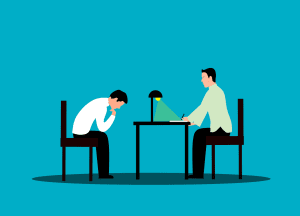As we celebrate World Mental Health Day on 10 October, people say staying mentally well with the help of a therapist is not affordable.

Mental Health(Creative Commons)
As we move up in life with our personal and professional selves, our mental well-being becomes increasingly important.
But, as we celebrate World Mental Health Day on Monday, 10 October, the cost of keeping ourselves mentally well with the help of a therapist seems to be getting out of hand.
Speaking to South First, people from various backgrounds shared that the cost of therapy was a little too much.
“The struggle starts with ourselves. We remain in denial for years that we are not mentally well. When we realise that we need help or therapy, our struggle starts,” said Sumanth Anand, an IT employee in Hyderabad.
He said that when he started looking for a therapist in Hyderabad, he couldn’t find one who charged below ₹1,500 per session.
“What do you do when you look for a therapist? You search on google, which I did. Wherever I called or texted, the price was in the range of ₹1,500-4,000 per session. When you look at it for the first time, it doesn’t seem much. But go for four sessions in a month, and that’s ₹6,000. That’s around ₹50,000 a year!” said Anand.
Rashmi Rathore, a student at Osmania University in Hyderabad, concurred, saying that the expenditure would start taking a toll over time.
“Finding a therapist is itself a time-consuming process. And if you get one, it takes sessions to settle down with the professional. It took me four sessions to open up to my therapist about what I was going through. By that time, I already had spent around ₹6,000,” she recounted.
“I didn’t have money the next time, so couldn’t go to the next session, and I relapsed. Not seeking therapy started to take a toll on me, resulting in more stress,” explained Rathore.
Anamika AN (name changed), a content writer from Kochi, said echoed similar sentiments, but pointed out something else.
“Now, after the Covid-19 pandemic, everything is online. Therapy has also started over Zoom or Google Meet. Therapists charge different prices for online and offline sessions. The online session was for ₹1,000, so I took it for a few sessions. However, it didn’t feel personalised, so I started offline therapy, which cost me ₹1,500 per session. It started further pinching my pocket, and it aggravated my stress,” said Anamika.

Therapy costs may seem a lot to the general public because mental health is often not prioritised. (Creative Commons)
Hyderabad-based therapist Soumaya Naidu told South First that as mental health therapy is often not prioritised, costs seem a lot to the general public.
“I have sat with patients who don’t see the point in going on because they are in intractable physical or emotional pain. How does one help them out? It’s a process of making them understand their own self and help them progress in life,” explained Naidu.
“I have to listen to a person for hours and hours, and the person takes a step to move forward after three months. It’s a process — a time-consuming process. You cannot get the result in a session or two,” she added.
Naidu also said that when she started her career, she used to charge only ₹600 per session.
“Now I have experience of eight years, and I charge differently for different people. For students, I charge quite less. and For professionals, I charge as per the industry norms,” she said.

The taboo around mental health and therapy complicates matters for those who might seek help. (Creative Commons)
R Mohith (name changed), who recently finished his BTech, said that convincing his family that he was suffering from a mental illness was tough, and then he had to quit his therapy sessions due to monetary constraints.
“Mental health is a taboo in our family and among our peers. First of all, they don’t understand what mental health is. I was not doing well since the third year of my four-year degree. I decided to take help after a few months. I obviously needed money for that. I was in a hostel. So, I used to ask my parents for money on some pretext or the other,” he recounted.
“But now that I am out of college, and not currently working anywhere, I can’t even ask for money. Not having a job is taking a lot from me, and not being able to afford therapy is another burden on my mental health,” explained Mohith.
Even if people manage to get a good therapist who charges reasonably per session, sometimes distance poses a hurdle.
“It took me six months to come to the realisation that I need help. But, I have to travel half the city to meet my therapist,” said Ritapriya Nandy, a PhD Scholar from the University of Hyderabad.
“Sometimes, I have to miss some sessions due to distance and my work, which creates problems and hampers progress,” she explained.
“Also, the time is not enough. There is a dedicated time slot for the session. When I start to open up to my therapist, she says, ‘Okay, will see you in the next session.’ Even if you find a good, affordable therapist, the distance and the time they spent with you can be quite a hurdle,” said Nandy.
Naidu, however, noted that compared to how much a person spends on leisure or food or several other things, mental health is quite affordable.
“What will you do if you do not feel well? Will go and buy a liquor bottle, which will cost you at least ₹800, and some food along with it? Let’s say you spend ₹1000. If you are doing it twice a month, why can’t you afford a therapist? Leisure, food, and other things are important but prioritising is also a key,” explained the therapist.

Mar 30, 2024

Mar 30, 2024

Mar 14, 2024

Mar 14, 2024

Mar 13, 2024